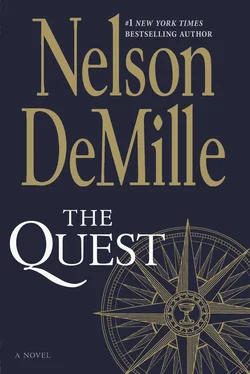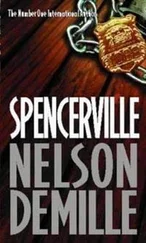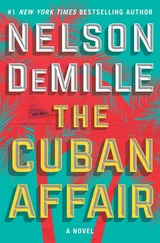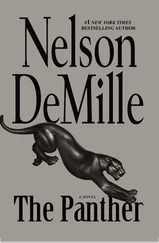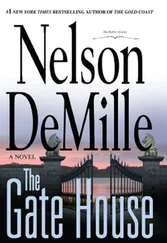Nelson Demille - The Quest
Здесь есть возможность читать онлайн «Nelson Demille - The Quest» весь текст электронной книги совершенно бесплатно (целиком полную версию без сокращений). В некоторых случаях можно слушать аудио, скачать через торрент в формате fb2 и присутствует краткое содержание. Год выпуска: 2013, ISBN: 2013, Издательство: Center Street, Жанр: Триллер, на английском языке. Описание произведения, (предисловие) а так же отзывы посетителей доступны на портале библиотеки ЛибКат.
- Название:The Quest
- Автор:
- Издательство:Center Street
- Жанр:
- Год:2013
- ISBN:1455576425
- Рейтинг книги:5 / 5. Голосов: 1
-
Избранное:Добавить в избранное
- Отзывы:
-
Ваша оценка:
- 100
- 1
- 2
- 3
- 4
- 5
The Quest: краткое содержание, описание и аннотация
Предлагаем к чтению аннотацию, описание, краткое содержание или предисловие (зависит от того, что написал сам автор книги «The Quest»). Если вы не нашли необходимую информацию о книге — напишите в комментариях, мы постараемся отыскать её.
The Quest — читать онлайн бесплатно полную книгу (весь текст) целиком
Ниже представлен текст книги, разбитый по страницам. Система сохранения места последней прочитанной страницы, позволяет с удобством читать онлайн бесплатно книгу «The Quest», без необходимости каждый раз заново искать на чём Вы остановились. Поставьте закладку, и сможете в любой момент перейти на страницу, на которой закончили чтение.
Интервал:
Закладка:
Mercado touched his arm and said, “It’s all right, Father-”
“Yes. Yes. Let me finish. So, we were taken to the Piazza Venezia. There was a military procession there. Tanks, cannons, trucks. I had never seen such things. It seemed that all Italy was in uniform. And he was there, also. The new Caesar, Il Duce. He stood like Caesar on a balcony. I did not like that man. He was too much with guns and the talk of war. And the king was there too. Victor Emmanuel. A decent man. Is he…?”
“Dead. There are no more kings, Father. Go on.”
“Yes. Dead. Everyone is dead. Forty years is a long time. Yes… I must finish. In the piazza they had the ceremony of the blessing of the guns. They put us to work, the priests from Sicily. We helped with the blessing. Then His Holiness arrived. He blessed the guns also. I did not like this. His Holiness stood with the king and Mussolini. Then came the cardinal, Eugenio. I was close to them. They spoke very intently. All the parade was going by for them, and the soldiers marched, but they paid no attention. I did not like the looks in their eyes. I was that close. Perhaps I imagined all this later… in the prison. The looks in their eyes, I mean. Perhaps they were talking about something else. Who knows? But I felt then, or maybe later, that they were talking about the thing…” His voice cracked and he stopped speaking.
Purcell picked up the canteen, but Mercado grabbed his arm. “You’ll kill him, Frank.”
“If he doesn’t have a bad stomach wound, we’re killing him with dehydration. If it’s bad, then he’s dead anyway. We can’t get him to a doctor for hours.”
Mercado nodded.
Purcell emptied the canteen over the old priest’s mouth, saying to Mercado, “Keep him on track, Henry. The monastery.”
Mercado said, “I’m starting to feel guilty about pushing a dying priest to stick to the facts and give us a good story.”
Purcell replied, “The whole point of the Catholic religion is guilt.”
Mercado ignored him and asked Father Armano, “Would you like to rest?”
“No. I must finish.” Father Armano continued, “The next day I was brought to an infantry battalion. The soldiers were all peasants from my province in Sicily. We went to a boat and the boat sailed for many days. And we sailed through Egypt and we could see Egypt on both sides of the canal. The boat went to Masawa, in Eritrea. You know the place? This was the new Caesar’s African empire. He called us his legions. ‘Go to Africa,’ he said, ‘and make Ethiopia Italian.’ In Masawa our engineers were building the harbor. Ships arrived with soldiers and tanks… there was going to be a war. A fool could see that. The army marched to Asmara. It rained every day. But then the dry season began… The governor of Eritrea assembled the army in front of his palace. He read us a telegram from Il Duce. ‘Avanti! I order you to begin the advance.’ Then a general-I cannot recall his name-he read a proclamation. He spoke of the new Fascist Italy and of sacrifice. The bishop of Asmara rang the church bells and everyone sang the Fascist anthem, ‘Youth.’ Everyone seemed happy on the outside. But on the inside, there was much sadness. I know this because the soldiers came to me and told me they were sad. We marched on Ethiopia. At first it was not so bad, except for the heat and the fatigue. In the early part of October we entered Adowa. There was little fighting. But then we marched out of Adowa and the army of the Ethiopians began to fight. So, this Ethiopian emperor was a brave man. Haile Selassie-they called him the King of Kings. The Conquering Lion of Judah. Descended from King Solomon and the Queen of Sheba, they said. A descendant of the House of David. A brave man. He led his army with his own person, while our new Caesar sat in Rome. I am sure this man is dead, no? He must have died in battle.”
“No,” said Mercado, “the emperor escaped to England, then returned to Ethiopia when the British drove out the Italians. He is still alive, but a very old man now.”
Purcell wondered if Father Armano could follow all this, but the priest said, “So, they are not all dead, then. Good. Someone lives from my time. This emperor was a brave man. His army was ill-equipped, but they fought like lions against our tanks and planes. But we won that war. That much I could see before my imprisonment.”
“Yes,” Mercado said, “you won that war. But you lost the big one afterwards. The one with the Americans and the English. Italy fought with Germany.”
“With Germany? Insanity. Which war is this one, then?”
Mercado was pulled in two directions. On one hand, he wanted to put the old priest’s mind to rest about all that had transpired in forty years. He actually enjoyed telling it to him. But on the other hand, there was the priest’s own story, which had to be finished.
He glanced at Purcell, who now seemed resigned to the priest’s recounting of all he remembered of the past and all his questions about the present. Mercado said to Father Armano, “It is a civil war, Father. Ethiopia now owns the old Italian colony of Eritrea. Some Eritreans, mostly the Muslims, want independence. They are fighting the Ethiopians. Inside Ethiopia itself, there are Christians and Muslims who no longer want the emperor. Mostly it is the army that no longer wants Haile Selassie as emperor, and they have arrested him, but he is well. He lives in his palace under house arrest. There are some Royalist forces who still fight the army. There are others who want neither the army nor the emperor. It is a very confused war and there is much unhappiness in this land. Also, there is famine. Famine for two years now.”
“Yes, I know of the famine.” He asked, “And the Gallas? I heard you mention them. They are not to be trusted. In the last war, they took advantage of the fighting and killed many on both sides. They love fighting. They love it when there is strife in the land.” There was actual anger in the old priest’s gentle voice. He said, “It was the Gallas who attacked the place where I was imprisoned… they killed everyone…”
Henry Mercado remembered the Gallas very well-fierce tribesmen with no loyalty beyond their clans. He said to the priest, “Yes. I remember from the last war. I was here then. I am from your time, too, Father.”
The old priest nodded and said, “You must not fall into their hands.” He looked at Vivian.
Mercado did not respond, but the priest’s warning awakened old and bad memories of that colonial war, and especially of the Gallas. Between 1936 and 1940, they fought the Ethiopian partisans who still carried on the fight against the Italians, and when the British took Ethiopia from the Italians in 1941, the Gallas harassed the retreating Italians as well as the advancing British and the reemerging Ethiopian partisan forces. Wherever there was a clash of arms, the Gallas heard it and rode to it on their horses. This was how they lived; on military plunder. And they didn’t know a white flag or a press card when they saw one. In quiet times, they stayed in the Danakil Desert, near Eritrea, or the Ogaden Desert, near Somalia. But when the dogs of war were let loose, as now, thought Mercado, they were all over the countryside, as though someone had shaken a beehive, and the famine had made them more fierce and more predatory than usual.
Mercado had suspected and the priest had confirmed that the Gallas were in the area, that the battle in the hills between Prince Joshua’s Royalist forces and the army forces of the Provisional government had drawn them like sharks to the smell of blood. They would sit in a place just like this spa and wait patiently for stragglers from one or the other army. Or if an army was badly beaten and retreating, they would attack the whole force. Yes, Mercado remembered them well. They butchered more than one beaten Ethiopian army and never spared the Western reporters who were with the army, and the Azebe Gallas, who populated this region, and who were neither Muslim nor Christian but pagan, were the worst of a bad lot. They hated the indigenous Amhara passionately, but they saved their most creative torture and death for Westerners.
Читать дальшеИнтервал:
Закладка:
Похожие книги на «The Quest»
Представляем Вашему вниманию похожие книги на «The Quest» списком для выбора. Мы отобрали схожую по названию и смыслу литературу в надежде предоставить читателям больше вариантов отыскать новые, интересные, ещё непрочитанные произведения.
Обсуждение, отзывы о книге «The Quest» и просто собственные мнения читателей. Оставьте ваши комментарии, напишите, что Вы думаете о произведении, его смысле или главных героях. Укажите что конкретно понравилось, а что нет, и почему Вы так считаете.
